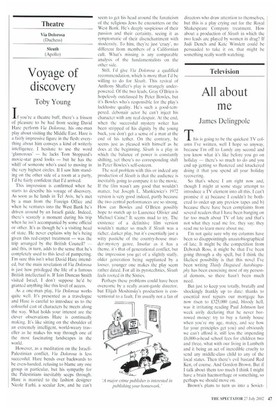Via Dolorosa (Duchess) Sleuth (Apollo)
Voyage of discovery
Toby Young
If you're a theatre buff, there's a frisson of pleasure to be had from seeing David Hare perform Via Dolorosa, his one-man play about visiting the Middle East. Hare is a fairly impressive figure in the flesh: everything about him conveys a kind of writerly intelligence. I hesitate to use the word 'glamorous' — he lacks Tom Stopparcl's movie-star good looks — but he has the whiff of someone who's used to moving in the very highest circles. If I saw him standing on the other side of a room at a party, I'd be fairly confident that I'd arrived.
This impression is confirmed when he starts to describe his voyage of discovery. As soon as he lands in Tel Aviv, he's met by a man from the Foreign Office and when he ventures into the West Bank he's driven around by an Israeli guide. Indeed, there's scarcely a moment during his trip when he isn't accompanied by some official or other. Its as though he's a visiting head of state. He never explains why he's being given this red-carpet treatment — was the trip arranged by the British Council? — and this, in turn, adds to the sense that he's completely used to this level of pampering. I'm sure this isn't what David Hare intended, but the main revelation of Via Dolorosa is just how privileged the life of a famous British intellectual is. If lain Duncan Smith visited Israel, I don't suppose he'd be granted anything like this level of access.
As a one-man play, Via Dolorosa works quite well. It's presented as a travelogue and Hare is careful to introduce us to the colourful cast of characters he meets along the way. What holds your interest are the clever observations Hare is continually making. It's like sitting on the shoulder of an extremely intelligent, world-weary traveller as he makes his way through one of the most fascinating landscapes in the world.
However, as a meditation on the IsraeliPalestinian conflict, Via Dolorosa is less successful. Hare bends over backwards to he even-handed, refusing to blame any one group in particular, but his sympathy for the Palestinians inevitably seeps through. Hare is married to the fashion designer Nicole Farhi, a secular Jew, and he can't seem to get his head around the fanaticism of the religious Jews he encounters on the West Bank. He's deeply suspicious of their passion and their certainty, seeing it as symptomatic of their disenchantment with modernity. To him, they're just 'crazy', no different from members of a Californian cult. What's missing is any comparable analysis of the fundamentalists on the other side.
Still, I'd give Via Dolorosa a qualified recommendation, which is more than I'd be willing to do for Sleuth. This revival of Anthony Shaffer's play is strangely underpowered. Of the two leads, Gray O'Brien is hopelessly outclassed by Peter Bowles, but it's Bowles who's responsible for the play's lacklustre quality. He's such a good-tempered, debonair actor he can't inject his character with any real despair. At the end, when the successful mystery writer has been stripped of his dignity by the young buck, you don't get a sense of a man at the end of his tether. On the contrary, he seems just as pleased with himself as he does at the beginning. Sleuth is a play in which the balance of power is constantly shifting, yet there's no corresponding shift in Peter Bowles's self-esteem.
The real problem with this or indeed any production of Sleuth is that the audience is inevitably going to compare it to the movie. If the film wasn't any good that wouldn't matter, but Joseph L. Mankiewicz's 1972 version is very good indeed, partly because the two central performances are so strong. How can Bowles and O'Brien possibly hope to match up to Laurence Olivier and Michael Caine? It seems mad to try. The existence of a definitive film version wouldn't matter so much if Sleuth was a richer, darker play, but it's essentially just a witty pastiche of the country-house murder-mystery genre. Insofar as it has a theme, it's that of generational conflict, but the impression you get of a slightly stuffy, older generation being supplanted by a looser, younger one makes the play seem rather dated. For all its pyrotechnics, Sleuth feels rooted in the Sixties.
Perhaps these problems could have been overcome by a really avant-garde director, hut Elijah Moshinsky's production is conventional to a fault. I'm usually not a fan of directors who draw attention to themselves, but this is a play crying out for the Royal Shakespeare Company treatment. How about a production of Sleuth in which the two leads are played by women in drag? If Judi Deitch and Kate Winslett could be persuaded to take it on, that might be something really worth watching.
































































 Previous page
Previous page